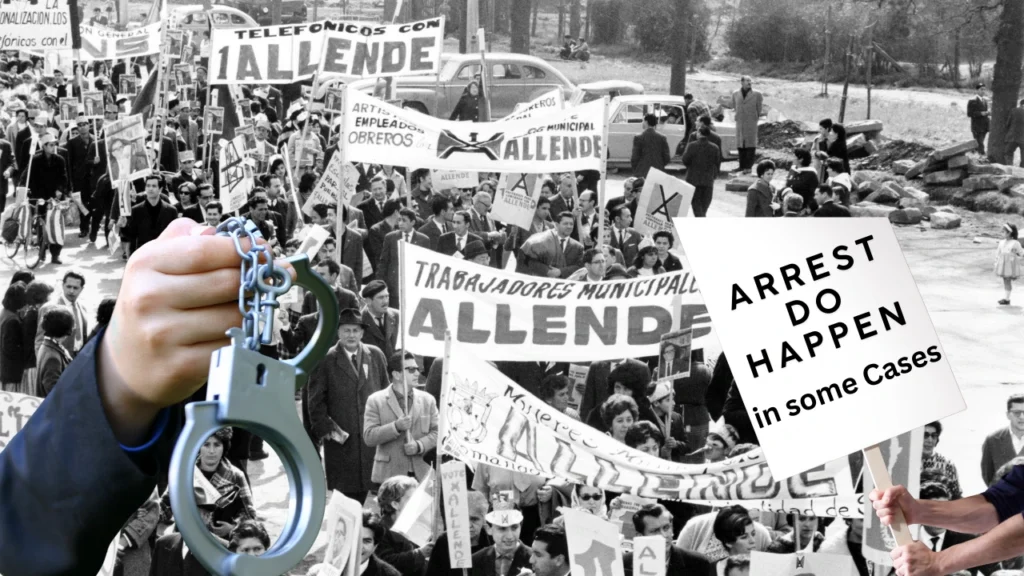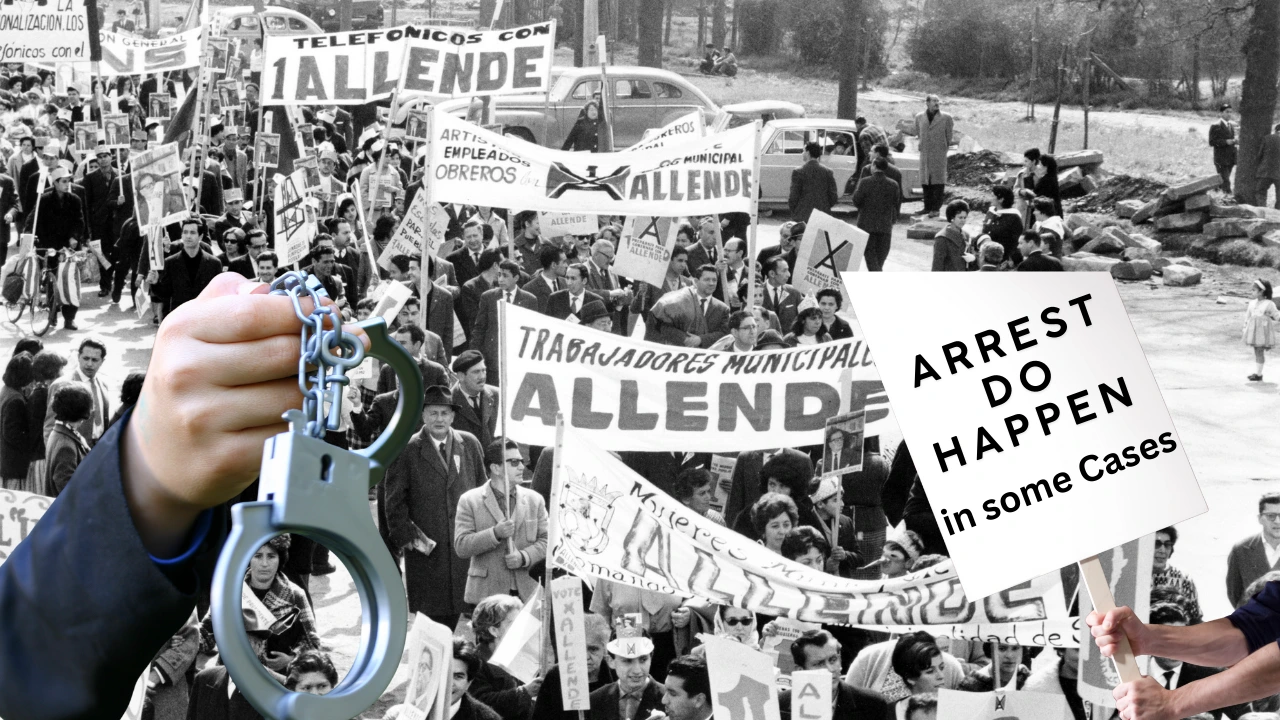Can You Be Arrested for Protesting in California?.Protesting is a powerful tool in democratic societies. In California, many people take to the streets, marches, vigils, sit-ins, or other demonstrations to express opinions, call for change, or show solidarity.
But a frequent question is: “Can I be arrested for protesting?” The short answer is yes under certain circumstances but there are also strong protections under both the U.S. and California Constitutions. Knowing where the line is drawn is key for protestors, law enforcement, and the public. This post explores those protections, what actions can lead to arrest, your rights, and tips to stay safe.
Can You Be Arrested for Protesting in California?-Overview
| Article on | Can You Be Arrested for Protesting in California? |
| Peaceful assembly in public spaces (streets, sidewalks, parks) | Unlawful assembly (violent, boisterous, or threatening gatherings) |
| Expressing opinions, holding signs, chanting | Ignoring lawful dispersal orders from police |
| Recording police/public officials in public areas | Violence, vandalism, or property damage |
| Protesting on private property with owner’s consent | Trespassing or blocking entrances/traffic without permission |
| Marching without permit if not blocking traffic | Violating curfews, permit rules, or creating safety hazards |
Legal Foundations: What Protects Your Right to Protest
- First Amendment (U.S. Constitution)
The First Amendment protects your rights to free speech, free press, petitioning the government, and assembly. Peaceful protest is one of the core forms of expressive conduct it protects. - California Constitution (Article I, Section 2)
California’s own constitution has similar protections: “Every person may freely speak, write, and publish their sentiments on all subjects…” This offers rights that are co-extensive or sometimes even broader than federal protections. - Time, Place, and Manner Restrictions
These are legal doctrines that say, even though speech and assembly are protected, the government can impose reasonable, content-neutral restrictions based on time, place, and manner (e.g. limiting noise, requiring permits, controlling traffic) so long as they don’t unduly burden the expressive content.

When Protesting Can Lead to Arrest: What Crosses the Line
Protesting becomes legally risky if certain conditions are met. Below are common scenarios where arrest is possible:
- Unlawful Assembly
Under California Penal Code § 407, a gathering can be declared “unlawful assembly” if two or more people are gathering for a criminal purpose—or if violent, boisterous, tumultuous behavior threatens public peace. Even if a protest starts peacefully, it can become unlawful under this statute if violence erupts or starts being threatened. - Failure to Disperse / Disobeying Dispersal Orders
Law enforcement may issue an order to disperse (when they determine there is an unlawful assembly, threat to safety, etc.). If protesters refuse to leave after a lawful order, that refusal can itself be a basis for arrests. - Violence, Vandalism, or Property Damage
If people at a protest engage in violence, damage property, or threaten safety, law enforcement may intervene and arrest those involved. Even someone who is not directly violent may be at risk if they are part of or near the violent action. - Trespassing or Blocking Property
If a protest is held on private property without permission, or protesters block private entrances, business operations, or other rights of the owners, that may lead to trespass charges. Also public spaces that are restricted in some way (e.g., bridges or roadways) may have restrictions. - Obstructing Traffic / Public Safety Hazards
Protests that block roads, interfere with emergency access, or create hazards may be curtailed or lead to arrests if people refuse to move or comply with orders. - Incitement, Threats, “True Threats,” or Fighting Words
Speech that is not merely unpopular but crosses into incitement of imminent lawless action, “true threats,” or fighting words is not protected. Speaking in a way that encourages imminent violence or lawbreaking can lead to legal consequences. - Violating Local Ordinances / Permit Requirements
Some cities require permits for large marches, amplified sound, or use of public venues. If you violate local rules (e.g. noise ordinances, permit requirements), you might face citations or arrest depending on the nature of the violation. - Emergency Orders, Curfews
In times of declared emergencies, civil unrest, natural disasters, authorities may impose curfews or special orders under local or state law. Violating them, even during a protest, can lead to arrest.
What to Expect If You Are Arrested
Knowing what usually happens helps people stay calm and preserve their rights.
- Charges Variability: Depending on what is alleged, the legal charge might be an infraction (minor, like a ticket/fine), a misdemeanor (possible jail time less than one year), or in more serious cases a felony.
- Booking & Detention: If arrested, you’ll be taken into custody, booked (fingerprints, mug shot, etc.), and held until bail or release conditions are met.
- Right to an Attorney: You have the right to consult with a lawyer. If you cannot afford one, one is appointed for you (in criminal cases). Always assert this right.
- Right to Remain Silent: You don’t have to answer questions beyond basic identifying information; avoid admissions or statements without legal counsel.
- Documentation Matters: If possible, note badge numbers, take photos/videos of what’s happening, and keep records of witnesses. This can be vital later.
Key Case Law & Examples
- Cohen v. California (1968): One famous case involved a man wearing a jacket with “Fuck the Draft” in a government building, arrested under disturbing the peace laws. The U.S. The Supreme Court overturned the conviction, protecting non-violent, provocative speech.
- Pruneyard Shopping Center v. Robins (1980): The U.S. The Supreme Court held that under the California Constitution, people could engage in expressive activities (like collecting signatures) in private shopping centers regularly open to the public, subject to reasonable rules.
Final Thoughts
Yes, you can be arrested for protesting in California but only under specific, legally justified circumstances. Arrests tend to happen when protestors cross into unlawful behavior (violence, threat, refusing lawful orders, property damage, safety hazards, etc.). On the other hand, peaceful protests deeply enjoy constitutional protection under both federal and California law.
FAQs for Can You Be Arrested for Protesting in California?
Can police shut down a peaceful protest?
Only if there is a clear, immediate threat to public safety, traffic, or property.
Am I allowed to record police at a protest?
Yes, as long as you don’t interfere with their duties.
Can I be arrested for protesting in California?
Yes, if you break laws such as unlawful assembly, trespassing, or ignore dispersal orders.
